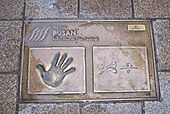Xie Jin
Xie Jin ( Chinese 謝晉 / 谢晋 , Pinyin Xiè Jìn ; born November 21, 1923 in Shaoxing , Zhejiang Province ; † October 18, 2008 in Shangyu , Zhejiang, China ) was a Chinese film director and screenwriter.
Life

Xie Jin was born the son of a wealthy banker and grew up mostly in Shanghai . He attended the Jiang-an School of Dramatic Arts in Sichuan . Xie was familiar with the works of Henrik Ibsen , William Shakespeare and Anton Chekhov and from 1938 he devoted himself to the theater as an actor. He later studied at the State Theater Institute with Cao Yu and Hon Shen . In 1949 he came to film through a position as assistant director at the Dataong film studios in Shanghai.
His first success brought him his feature film Nu lan wu hao (1957, English title: Woman Basketball Player No. 5 ) about the life of various athletes in China, with which he was to make a reputation for himself as a leading woman director. Hong se niang zi jun (1961, The Red Detachment of Women ) followed in 1961, telling the story of farmers who were trained to be soldiers in the 1930s. Three years later, Xie directed Wutai jiemei (1964, known in English-speaking countries as Stage Sisters or Two Stage Sisters ) through two befriended opera actresses. While one drifts into crime, the other begins to sympathize with the revolutionary movement in the 1950s.
After the publication of Wutai jiemei , Xie became a victim of the Chinese Cultural Revolution in the 1960s. He could no longer find a job as a film director, was separated from his family and placed under house arrest. His parents could not withstand political pressure and committed suicide. Both of them had advised their son to emigrate to the United States and study there in the late 1940s , but Xie refused. Xie later worked as a cleaner in film studios. After the Cultural Revolution he was rehabilitated and appointed as assistant to Mao Zedong's fourth wife Jiang Qing , with whom he brought “model operas” to the stage or screen.
His earlier works, which combined socialist realism with the aesthetics of Hollywood melodramas in the style of Douglas Sirk , were rediscovered in the early 1980s. Wutai jiemei received the prestigious Sutherland Trophy of the British Film Institute in 1980 . In the 1980s, Xie successfully dedicated three films to the Cultural Revolution, but avoided taking up politically sensitive issues or discrediting the Chinese government: The Legend of the Tianyun Mountains (1980), Mu Ma Ren (1982, The Herdsman ), the reached an audience of 150 million people in China, as well as Fu rong zhen with Jiang Wen and Liu Xiaoqing (1986, Hibiscus Town ). The first film mentioned brought Xie the directorial award at the 1981 Golden Rooster Awards , China's national film award. Internationally, however, Xie was unable to match the success of young compatriots like Chen Kaige or Zhang Yimou . One of Xie's last films was The Opium War in 1997 , which was about the first Opium War . With a budget of $ 15 million, it was one of the most expensive films ever produced by a Chinese film studio at the time.
Xie Jin was married with one son. In 2008, two months after his son was killed, the 84-year-old director was found dead in a hotel in southeast China where he had planned to attend the 100th anniversary celebrations of his former school. The exact circumstances of his death are not known. Xie was the first Chinese filmmaker to become a member of the Academy of Motion Picture Arts and Sciences and the Directors Guild of America . In 1987, along with Néstor Almendros and Klaus Maria Brandauer , Xie was a member of the competition jury at the Venice Film Festival , which awarded Hou Hsiao-Hsien's drama A City of Sadness the Golden Lion .
Filmography (selection)
- 1957: Nülan wuhao - 女籃 5 號 / 女篮 5 号 , English Woman Basketball Player No. 5
- 1961: Hongse niangzijun - 紅色 娘子軍 / 红色 娘子军 , English The Red Detachment of Women
- 1962: Dali, Xiaoli he Laoli - 大 李 , 小李 和 老李 English Big Li, Little Li and Old Li
- 1965: Wutai jiemei - 舞台 姐妹 English Two Stage Sisters
- 1975: Chunmiao - 春苗 , English Spring Sapling
- 1977: Qingchun - 青春 , English Youth - "The Youth"
- 1979: A, yaolan - 啊! 搖籃 / 啊! 摇篮 , English Cradle - "The cradle"
- 1980: Tianyunshan chuanqi - 天 雲山 傳奇 / 天 云山 传奇 , English Legend of Tianyun Mountain - "The legend of the Tianyun Mountains"
- 1982: Mumaren - 牧馬 人 / 牧马 人 , English The Herdsman - "The Horse Shepherd "
- 1984: Qiu Jin - 秋瑾 English Qiu Jin: A Revolutionary
- 1985: Gaoshan xia de huahuan - 高山 下 的 花環 / 高山 下 的 花环 , English Wreaths at the Foot of the Mountain
- 1986: Furong zhen - 芙蓉鎮 / 芙蓉镇 , English Hibiscus Town
- 1989: Zuihou de guizu - 最後 的 貴族 / 最后 的 贵族 , English The Last Aristocrats
- 1992: Qingliangsi de zhongsheng - 清涼寺 鐘聲 / 清凉寺 的 钟声 , English Bell of Purity Temple
- 1993: Laoren yǔ gou - 老人 與 狗 / 老人 与 狗 , English An Old Man and His Dog
- 1994: Bailuyuan
- 1995: Nü'er gu - 女兒 谷 / 女儿 谷 , English Penitentiary Angel, Behind the Wall of Shame
- 1997: Yapian zhanzheng - 鴉片戰爭 / 鸦片战争 , English The Opium War - " The Opium War "
- 2000: Nüzu jiuhao - 女足 九號 / 女足 九号 , English Woman Soccer Player No. 9
Awards
- Hundred Flowers Awards , Hundred Flowers Award 1962 for best director - Hong se niang zi jun
- British Film Institute , 1980 Sutherland Trophy for the film - Wutai jiemei
- Golden Rooster Awards , Golden Rooster 1981 for the film - Tian yun shan chuan qi
- Golden Rooster Awards , 1985 Golden Rooster nomination for best director - Gao shan xia de hua huan
- Karlovy Vary International Film Festival , Crystal Globe 1988 for the film - Fu rong zhen
- Beijing Film Academy , Jury Award 1996 Honorary Award for the film - Nü'er gu
- Montréal World Film Festival , nomination Grand Prix des Amériques 1997 for the film - The Opium War ( Yapian zhanzheng )
- Golden Rooster Awards , nomination for the 1997 Golden Rooster for Best Director - The Opium War ( Yapian zhanzheng )
- Golden Rooster Awards , for Lifetime Achievement Award 2005
Web links
- Xie Jin in the Internet Movie Database (English)
- Xie Jin in Cineartistes (French, English, Spanish)
- Xie Jin in Chinese Movie Database (Chinese, English)
- Xie Jin in Hong Kong Movie Database (Chinese, English)
- Interview in the magazine Jump Cut (English)
Individual evidence
- ↑ a b c cf. Xie Jin . In: The Times , October 24, 2008, p. 82
- ↑ a b c d e f g cf. Bergan, Ronald: Xie Jin: Chinese film director who survived the cultural revolution . In: The Guardian , October 20, 2008, p. 33
- ↑ cf. Biography in the All Movie Guide (English; accessed August 20, 2009)
- ↑ cf. Obituary of Xie Jin Chinese film director who survived the Cultural Revolution to create several box-office triumphs . In: The Daily Telegraph , October 24, 2008, p. 35
- ↑ a b cf. Lee, Min: Chinese movie director Xie Jin dead at age 84 . Associated Press Worldstream, Oct 19, 2008 8:41 AM GMT, Hong Kong
| personal data | |
|---|---|
| SURNAME | Xie Jin |
| ALTERNATIVE NAMES | 謝晉 (Chinese - traditional character); 谢晋 (Chinese - abbreviation) |
| BRIEF DESCRIPTION | Chinese film director |
| DATE OF BIRTH | November 21, 1923 |
| PLACE OF BIRTH | Shaoxing , Zhejiang Province |
| DATE OF DEATH | October 18, 2008 |
| Place of death | Shangyu , Zhejiang |
